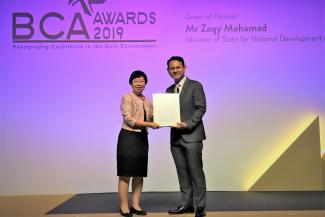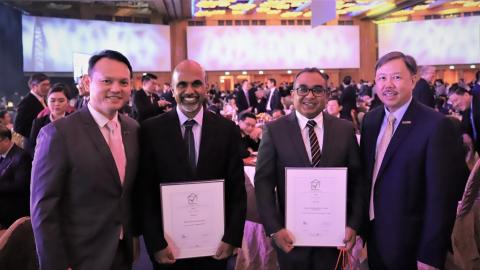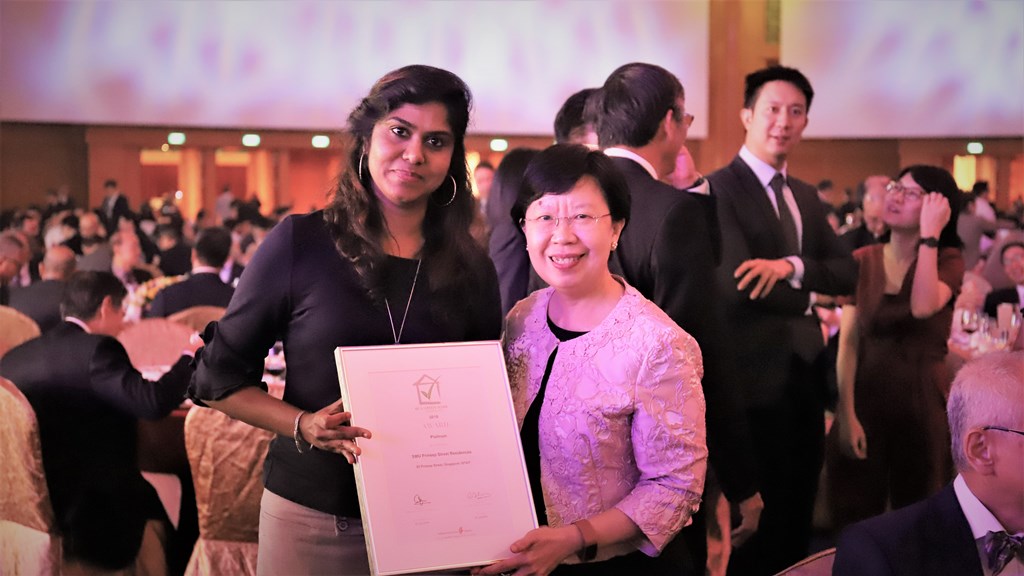
SMU’s commitment to sustainably develop a clean, green and healthy environment for the SMU Community and beyond has seen the university garner four Green Mark Platinum Awards by the Building and Construction Authority (BCA).
The BCA Awards were presented by Minister of State for National Development Zaqy Mohamad at a ceremony held at Resorts World Sentosa on 29 May 2019.
The four projects which won the awards were SMU Tahir Connexion Foundation, SMU City Campus, SMU Administration Building, and SMU Prinsep Street Residences. With SMU clinching these 2019 BCA Green Mark for Buildings-Platinum, the university has achieved 100 per cent Green Mark Platinum status for its entire campus.
Before the ceremony, SMU also signed an Agreement of Partnership with BCA and Singapore University of Technology and Design to develop training programmes for BCA’s new iBuildSG Leadership Engagement and Development (LEAD) Framework, which supports leadership development in the built environment sector.

Mr Sundaravadivelan Selvam (2nd from left), Vice President of SMU Office of Campus Infrastructure and Services (OCIS), with the BCA Green Mark Platinum Award for SMU Administration Building, and Mr Shantul Malviya (2nd from right), Senior Assistant Director, OCIS, with the BCA Green Mark Platinum Award for SMU City Campus, posing for a photo with Minister of State Zaqy Mohamad (extreme left) and Mr Hugh Lim, CEO of BCA (extreme right).
SMU President Professor Lily Kong said, “We are delighted to have received the BCA Awards. The four awards are testimony to SMU’s commitment to and efforts in maintaining and operating its buildings on a par with the highest industry standards with regard to environmental sustainability. The awards also serve as a recognition of SMU’s efforts in leading and pushing its sustainability endeavours to a higher level by adopting the latest green solutions for the development of its new buildings and facilities.
“With the Green Mark standards evolving and the bar set ever higher, SMU has constantly sought to improve by pro-actively exploring new solutions and technologies which could be leveraged to upgrade its existing buildings and in future developments.”
Ms Bharathy G Shanmugam (left), Head-Campus Development, OCIS, with the BCA Green Mark Platinum Award for Prinsep Street Residences, and SMU President Prof Lily Kong.
Mr Sundaravadivelan Selvam, Vice President of SMU Office of Campus Infrastructure and Services, shared that the key reasons which enabled SMU to win the awards are: adopting a whole-of-University approach to sustainability, alignment with national objectives, and developing quality infrastructure to support SMU’s dynamic pedagogical and operational requirements.
On adopting a whole-of-University approach to sustainability, Mr Sundar said that despite almost a doubling of its student population over the last decade and the addition of new buildings and facilities, SMU has achieved significant reductions in water and electricity consumption with purposeful guidance by the University’s management, as well as the upgrading of equipment to more water and energy-efficient ones by the functional units. “Beyond hardware improvement, concerted efforts through ground-up and management-led awareness activities have contributed to a noticeable shift in the behaviour of SMU faculty, staff and students in becoming more proactive in conserving water and electricity,” he said.
Mr Sundar added that various agencies, especially BCA, have been the key enablers for SMU in exploring and implementing new sustainability initiatives. He also lauded the efforts by consultants and contractors, equipped with the latest global industry knowledge and technological know-how, in helping SMU realise its sustainability goals. “Their orientation and commitment towards environment sustainability have been instrumental in aligning the efforts for seamless delivery of green buildings in SMU”, he said.
Salient green features of the four award-winning projects
Tahir Foundation Connexion
- On-site net-zero energy building with Energy Usage Index of 58.5 kWh/m2/year.
- Self-shading building form, shading devices, insulated building envelope with low-emissivity double glazing, resulting in an Envelope Thermal Transfer Value (ETTV) of 25.6 W/m2
- Optimized lighting design with daylight utilisation, dimming control, photocell & occupancy sensor, and LED lighting
- Highly efficient chiller plant system with efficiency of 0.53 kW/RT
- Innovative Enhanced Passive Displacement Cooling (EPDC) System, saving 92% of air distribution energy
- SMART building control system controls lighting, chilled water, fresh air, plug loads, and AV equipment at each zone of the building
- Mass Engineered Timber (MET) structure reduces embodied carbon of the building
SMU’s City Campus
- Chiller plant system efficiency of 0.53 kW/RT
- High efficiency T5 and LED lightings with electronic ballast
- All air handling units (AHU) are designed with electronic air cleaner
- Motion sensors control the cooled air supply to study rooms, meeting rooms, staff lounges and faculty offices
- Use of PUB’s Water Efficiency Labelling Scheme (WELS)-certified fittings and awarded as Water Efficient Building
- CO2 sensors are used to regulate outdoor air flow rate
- Priority green lots for Hybrid/Compressed Natural Gas/Electric vehicles
SMU Administration Building
- The building façade is cladded with double and low-emissivity glazing, which effectively reduce solar heat gains by the building
- Chiller plant system efficiency of 0.56 kW/RT
- Use of PUB’s Water Efficiency Labelling Scheme (WELS)-certified fittings and awarded as Water Efficient Building
- High efficiency T5 and LED lightings with electronic ballast
- All air handling units (AHU) are designed with electronic air cleaner
- Auto tube cleaning system for the chiller plant
- Priority green lots for Hybrid/Compressed Natural Gas/Electric vehicles
SMU Prinsep Street Residences
- Estimated energy savings of 274,824 kWh/year
- New chiller plant with system efficiency of 0.6 kW/RT.
- Efficient Passive Displacement Cooling (PDC) for cooled air distribution
- Energy Smart Integrated System for controlling, monitoring, tracking the operations of all building services, e.g. Primary Domain Controller, lights, fans, plug loads and power meters
- Efficient dimmable LED lighting system
- Extensive use of sustainable products certified by Singapore Green Building Council and Singapore Green Labelling Scheme
- Lightings in staircases are controlled based on motion detection
Supporting leadership development in the built environment sector
(Front row L-R) Prof Lily Kong, SMU President; Mr Hugh Lim, BCA CEO and Prof Pey Kin Leong, Associate Provost, SUTD at the Signing Ceremony for iBuildSG LEAD Programmes. The ceremony was witnessed by (Back row L-R) Mr Cheng Hsing Yao, representing Construction Industry Joint Committee; Mr Zainal Sapari, representing National Trade Union Congress; Mr Lee Fook Sun, BCA Chairman and Ms Chelvin Loh, representing SkillsFuture Singapore.
Under BCA’s new iBuildSG Leadership Engagement and Development (LEAD) Framework, there are two structured programmes run by SMU as the anchor institution - the LEAD Horizon Programme for young emerging leaders who are nominated by firms for leadership pipeline, as well as the LEAD Milestone Programme for those who are already part of the C-suite team within the organisations. These training programmes will adopt a case-based learning approach contextualised to the built environment sector and will be complemented with learning journeys, case study development, networking opportunities and dialogue sessions that BCA will be organising with key policy makers and Public Sector senior leadership, to engage the leaders under the framework.
“SMU is delighted to partner with BCA to launch two bespoke structured training programmes under the new iBuildSG LEAD framework. These Programmes aimed at the middle level leaders and enterprise leaders in the Built Environment sector represent a fusion of experiential and interactive learning, facilitated by experienced SMU faculty and industry leaders. We are confident that our programme participants will value the many real-life case studies, practice-driven approach to teaching and networking opportunities. With expertise in delivering tailored and industry-specific programmes, SMU’s Executive Development presents a robust offering that will well address the needs of leaders and senior executives who are tackling today’s challenges,” said SMU President, Professor Lily Kong.
SMU will tap its business and management expertise to run the LEAD Horizon Programme, an 8-day Executive Development Programme which aims to build participants’ self-leadership and innovative mindset, develop commercial awareness and enhance their capacity in cross-disciplinary collaboration. This is complemented by a 3-day workshop-based Innovation Bootcamp conducted by SUTD to develop innovative leadership through design thinking approach.
The LEAD Milestone Programme will focus on the development of cohesive and progressive enterprises through fostering stronger collaboration to catalyse industry transformation. This programme is intended to support senior leadership succession in firms and Trade Associations and Chambers, and provide an important opportunity to foster cohesion amongst the future leaders of industry. It will also offer an important touchpoint to build shared perspectives for industry transformation. SMU will conduct a 6-day Advanced Management Programme, which would be complemented by a 9-day Overseas Immersion that includes collaboration with Imperial College London as well as best-in-class visits targeting high growth regions such as in China and India.
Featured photo: SMU President Professor Lily Kong received the BCA Green Mark Platinum (Zero Energy) Award for Tahir Foundation Connexion from Minister of State Zaqy Mohamad.
